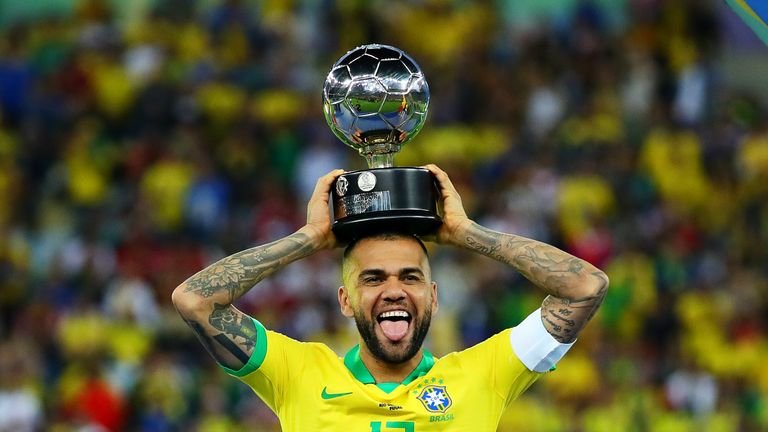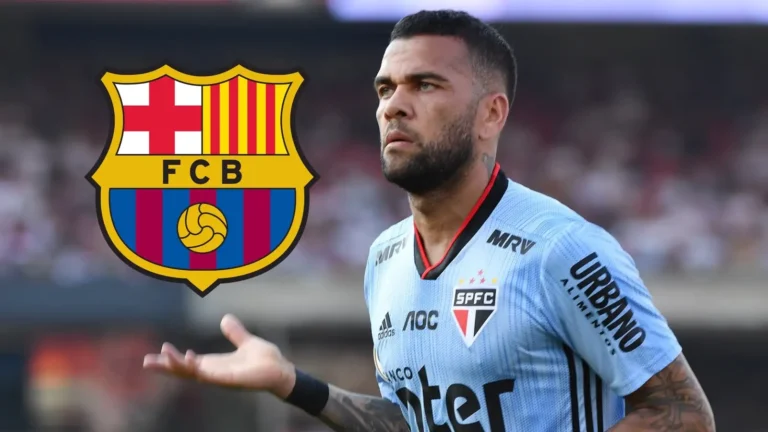Dani Alves is widely regarded as one of the greatest right-backs in football history. His career, spanning over two decades, has been marked by extraordinary success, unwavering passion, and an undeniable impact on the game. Alves is not only known for his defensive capabilities but also for his attacking prowess, leadership, and ability to contribute to his team’s success. Throughout his journey, he has played for some of the most prestigious clubs in the world and has won an unparalleled number of trophies. This article delves into his early life, career milestones, playing style, achievements, and lasting legacy in football.
Early Life and Beginnings in Brazil
Born on May 6, 1983, in Juazeiro, Brazil, Dani Alves developed a love for football at a young age. Coming from a humble background, his father, Domingos Alves, played a crucial role in shaping his passion for the sport. Alves began his football journey playing for local clubs before joining the youth academy of Bahia, a club in Brazil’s top division.
At Bahia, Alves quickly showcased his immense talent, earning a spot in the first team in 2001. His performances as a right-back caught the attention of European scouts, leading to his move to Spain, where he would embark on a journey that would define his career.
The Sevilla Years: Establishing a Reputation
In 2002, Dani Alves joined Sevilla, initially on loan before making a permanent move in 2003. Under the management of Juande Ramos, Alves became a key player for the club. His attacking mindset, defensive reliability, and tireless work rate helped Sevilla achieve great success during his tenure.
One of Alves’ most remarkable achievements at Sevilla was winning back-to-back UEFA Cups in 2006 and 2007. His performances in these tournaments solidified his reputation as one of Europe’s top right-backs. He also played a crucial role in Sevilla’s Copa del Rey, Spanish Super Cup, and UEFA Super Cup triumphs. His consistency and outstanding displays soon attracted the interest of one of the biggest clubs in the world—FC Barcelona.
Barcelona: The Golden Era
In 2008, Dani Alves made a high-profile move to Barcelona, reuniting with Pep Guardiola, who had just taken charge of the club. This transfer marked the beginning of an era where Alves would establish himself as one of the best right-backs in football history.
At Barcelona, Alves became an essential part of the team’s tiki-taka playing style. His ability to overlap, provide dangerous crosses, and link up with Lionel Messi made him a key offensive asset. He was also instrumental in Barcelona’s pressing system, showcasing his defensive skills and work ethic.
During his first season (2008–09), Barcelona won the historic treble, securing La Liga, Copa del Rey, and the UEFA Champions League titles. Alves played a pivotal role in all three competitions. Over his eight-year tenure at Barcelona, he won multiple La Liga titles, Copa del Rey trophies, and Champions League titles, solidifying his legacy as one of the club’s greatest defenders.
Juventus and PSG: Continuing the Legacy
After leaving Barcelona in 2016, Dani Alves joined Juventus for a brief but impactful stint. He helped the Italian giants win the Serie A title and reach the UEFA Champions League final in 2017. Despite spending only one season in Italy, Alves demonstrated his quality and adaptability in a new league.
In 2017, Alves moved to Paris Saint-Germain (PSG), where he continued his winning ways. During his two-year stay in France, he won multiple Ligue 1 titles, domestic cups, and further cemented his reputation as a serial winner. His leadership and experience played a crucial role in PSG’s dominance in French football.
Return to Brazil and International Success
After leaving Europe, Alves returned to Brazil, joining São Paulo FC in 2019. Despite his age, he remained a top performer, helping the club secure the Campeonato Paulista in 2021. His return to Brazil also demonstrated his desire to continue contributing to football in his home country.
On the international stage, Dani Alves has had an illustrious career with the Brazilian national team. He has won multiple titles, including the Copa América (2007, 2019) and FIFA Confederations Cup (2009, 2013). Additionally, he captained Brazil to a gold medal in the 2020 Tokyo Olympics, further showcasing his leadership and influence on the game.
Playing Style and Influence

Dani Alves redefined the role of a right-back with his attacking mindset and technical ability. Unlike traditional full-backs, Alves was heavily involved in the attacking play, often operating as an additional winger. His dribbling, crossing, and ability to cut inside made him a constant threat to opposition defenses.
Defensively, Alves was known for his aggressive pressing, quick recovery, and ability to read the game. His versatility allowed him to play in various positions, including midfield when needed. His unique playing style has influenced a new generation of right-backs, many of whom model their game after him.
Records and Achievements
Dani Alves holds the record for the most trophies won by a footballer, with over 40 titles to his name. Some of his most notable achievements include:
- 3 UEFA Champions League titles (2008–09, 2010–11, 2014–15) with Barcelona
- 6 La Liga titles with Barcelona
- 2 Copa América titles with Brazil
- Olympic Gold Medal in 2020
- Multiple domestic league titles in Spain, Italy, and France
His trophy haul is a testament to his consistency, work ethic, and ability to perform at the highest level across different leagues and competitions.
Legacy and Impact on Football
Dani Alves’ influence on football extends beyond his on-field performances. His leadership, charisma, and love for the game have made him an inspiration to young footballers worldwide. His journey from a small town in Brazil to becoming one of football’s most decorated players is a testament to his dedication and passion.
Alves has also been known for his outspoken nature, advocating for social issues and using his platform to promote positive change. His presence in the football community remains significant, even as his playing career winds down.
Conclusion
Dani Alves is a football icon whose impact on the game will be remembered for generations. His skill, passion, and determination have made him one of the greatest right-backs in history. From his early days in Brazil to his legendary status in Europe, Alves has left an indelible mark on football. His journey serves as an inspiration to aspiring players, proving that hard work and dedication can lead to extraordinary success. Whether on or off the pitch, Dani Alves’ legacy will continue to shine brightly in the world of football.
Read more: The Passing of Paul O’Grady: Cause of Death and Legacy


